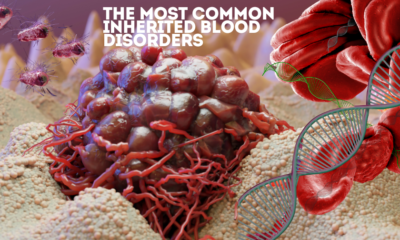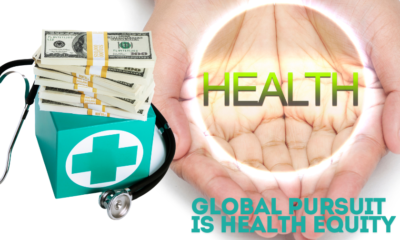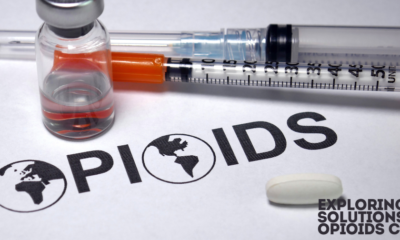Mental Health
Maternal Health and Prenatal Care: Ensuring a Healthy Start for Your Baby

Good maternal health is not just about the absence of disease; it is about ensuring a healthy, happy pregnancy and a safe delivery, resulting in a healthy start for the baby. Maternal health is a critical aspect of public health that focuses on the well-being of women during pregnancy, childbirth, and the postnatal period. Prenatal care, an essential part of maternal health, involves a range of healthcare services provided to expectant mothers to monitor and promote the health of both the mother and the developing fetus. This article will explore the importance of maternal health and prenatal care, the components of comprehensive prenatal care, challenges in accessing care, and strategies to improve maternal and neonatal outcomes.
The Importance of Maternal Health
Maternal health is vital for several reasons. Firstly, it is closely linked to the health and well-being of the newborn. The conditions that a mother experiences during pregnancy can have lasting impacts on the child, including their growth, development, and susceptibility to diseases later in life. A healthy pregnancy reduces the risk of premature birth, low birth weight, and infant mortality. Secondly, pregnancy and childbirth pose significant health risks to the mother herself. Complications such as preeclampsia, gestational diabetes, infections, and hemorrhages can arise, making regular medical attention necessary. Maternal health is also intertwined with societal well-being. When women receive the care and support they need, they are better able to contribute to their families, communities, and economies.
The Role of Prenatal Care
Prenatal care is the cornerstone of maternal health. It involves regular visits to healthcare providers throughout the pregnancy to ensure the mother and the baby are healthy. Prenatal care typically begins within the first trimester and continues through the delivery of the baby. The goal of prenatal care is to:
1) Monitor the Health of the Mother and Baby: Regular check-ups allow healthcare providers to track the health and development of the fetus and identify any potential health issues in the mother that may affect the pregnancy.
2) Prevent and Manage Complications: Prenatal care helps in the early detection of complications such as gestational diabetes, hypertension, or anemia. Early diagnosis enables timely intervention, which can prevent serious outcomes.
3) Provide Health Education and Counseling: Prenatal visits provide an opportunity for healthcare providers to educate expectant mothers about nutrition, exercise, childbirth, breastfeeding, and newborn care. Counseling on lifestyle choices, such as avoiding alcohol, smoking, and certain medications, is also provided.
4) Support Emotional and Mental Well-being: Pregnancy can be emotionally challenging for many women. Prenatal care provides a supportive environment where mothers can express their concerns, fears, and anxieties and receive appropriate counseling and support.
Critical Components of Comprehensive Prenatal Care
Comprehensive prenatal care encompasses various components designed to support a healthy pregnancy and delivery. These components include:
1) Regular Medical Check-ups
Regular visits to a healthcare provider are essential throughout pregnancy. The frequency of these visits typically increases as the pregnancy progresses. During these check-ups, healthcare providers perform several routine tests and screenings, including:
- Ultrasound Scans: These scans provide vital information about the baby’s growth, position, and development. Ultrasound is also used to detect any congenital abnormalities.
- Blood Pressure Monitoring: High blood pressure during pregnancy can be a sign of preeclampsia, a serious condition that requires close monitoring and management.
- Blood Tests: Blood tests help identify anemia, infections, and blood type, as well as screen for conditions like gestational diabetes.
- Weight and Abdominal Measurements: These measurements help monitor the baby’s growth and the mother’s overall health.
2) Nutritional Guidance and Support
Proper nutrition is fundamental to a healthy pregnancy. During prenatal visits, healthcare providers offer guidance on maintaining a balanced diet rich in essential nutrients like folic acid, iron, calcium, and omega-3 fatty acids. Folic acid is necessary in the first trimester as it helps prevent neural tube defects in the developing fetus. Iron is crucial for preventing anemia, which can lead to fatigue and complications during delivery. Regular weight gain monitoring helps ensure that the mother is gaining an appropriate amount of weight, as both underweight and overweight pregnancies can pose risks to the baby.
3) Screening and Management of Pregnancy Complications
Certain medical conditions and complications can arise during pregnancy that require careful monitoring and management:
- Gestational Diabetes: A type of diabetes that develops during pregnancy, gestational diabetes can increase the risk of complications for both the mother and baby. Regular blood glucose testing and dietary management are important to control this condition.
- Preeclampsia: This condition is characterized by high blood pressure and signs of damage to other organ systems. It can lead to serious complications if not managed properly. Close monitoring, lifestyle modifications, and sometimes medication are used to manage preeclampsia.
- Infections: Screening for infections such as HIV, syphilis, and Group B Streptococcus is crucial as they can be transmitted to the baby during childbirth.
4) Education and Counseling on Healthy Lifestyle Choices
Lifestyle choices significantly impact pregnancy outcomes. Counseling on avoiding alcohol, tobacco, and illicit drugs is an essential component of prenatal care. Smoking and alcohol consumption during pregnancy are associated with low birth weight, premature birth, and developmental disorders. Prenatal care also includes advice on safe physical activities, stress management, and adequate rest.
5) Vaccinations
Vaccinations are crucial to protect both the mother and the unborn baby from infections that can cause severe complications. The Tdap vaccine (tetanus, diphtheria, and pertussis) is recommended during each pregnancy, regardless of the mother’s vaccination history. The flu vaccine is also advised to protect against influenza, which can be more severe in pregnant women.
6) Planning for Delivery and Postpartum Care
Prenatal care is not limited to the pregnancy period; it also involves planning for delivery and postpartum care. This includes discussing delivery options, pain management during labor, and preparation for possible emergencies. Postpartum care planning involves guidance on recovery, breastfeeding support, and postpartum depression screening.
Challenges in Accessing Maternal and Prenatal Care
Despite the clear benefits of prenatal care, several barriers prevent women from accessing these vital services, particularly in low-income and developing regions. Some of the most common challenges include:
1) Socioeconomic Barriers
Socioeconomic status is one of the most significant determinants of access to healthcare. Women from low-income backgrounds often face challenges such as the inability to afford healthcare services, lack of insurance coverage, and limited access to nutritious food and supplements. In many cases, they also face transportation difficulties, making it challenging to attend regular prenatal visits.
2) Geographical Barriers
Women living in rural or remote areas often have limited access to healthcare facilities. In some regions, healthcare centers are sparse and far from rural communities, leading to significant travel time and costs. This geographical isolation can result in inadequate prenatal care, putting both the mother and baby at risk.
3) Cultural and Social Barriers
Cultural beliefs and social norms can also affect the utilization of prenatal care. In some cultures, there may be misconceptions about pregnancy and childbirth, leading to a preference for traditional birth attendants over trained healthcare providers. Additionally, societal norms that restrict women’s autonomy can limit their ability to seek care independently.
4) Healthcare System Limitations
The quality and availability of maternal healthcare services can vary significantly, even within the same country. In some regions, there is a lack of trained healthcare professionals, inadequate facilities, and limited availability of essential medicines and equipment. This can result in suboptimal prenatal care and poor maternal and neonatal outcomes.
5) Psychosocial Barriers
Psychosocial factors, such as fear of hospitals, mistrust of medical professionals, and concerns about privacy, can also deter women from seeking prenatal care. Mental health issues such as anxiety, depression, or previous traumatic experiences related to pregnancy or childbirth can further hinder access to care.

Strategies to Improve Maternal Health and Prenatal Care
A multi-pronged approach involving governments, healthcare providers, communities, and international organizations is required to address the challenges and improve maternal and neonatal outcomes. Some key strategies include:
1) Strengthening Healthcare Systems
Strengthening healthcare systems is critical to improving maternal health. This involves ensuring that healthcare facilities are adequately staffed with trained professionals and equipped with the necessary resources, such as medicines, diagnostic tools, and birthing supplies. Governments must invest in healthcare infrastructure, particularly in underserved rural areas, to provide comprehensive prenatal and maternal care.
2) Improving Access to Quality Care
Ensuring universal access to quality maternal healthcare services is essential. This can be achieved through policies that provide free or subsidized prenatal care services, especially for low-income families. Telemedicine can also play a vital role in improving access, particularly in remote areas, by providing consultations, counseling, and follow-up care through digital platforms.
3) Community-Based Interventions and Education
Community-based programs can help raise awareness about the importance of prenatal care and dispel myths and misconceptions surrounding pregnancy and childbirth. Training community health workers to provide essential prenatal services and refer women to healthcare facilities can also improve remote access. Empowering women with education and knowledge about their health can help them make informed decisions and seek appropriate care.
4) Integrating Mental Health Support
Integrating mental health services into prenatal care is crucial to addressing the psychological challenges that pregnant women may face. Screening for depression, anxiety, and other mental health conditions should be a standard part of prenatal care, and appropriate counseling and support services should be made available.
5) Culturally Sensitive Approaches
Healthcare providers must be trained to understand and respect cultural beliefs and practices. Providing culturally sensitive care that aligns with community values while ensuring evidence-based medical practices can improve trust and encourage more women to seek care. This approach requires active engagement with community leaders and stakeholders to promote positive health behaviors.
6) Encouraging Male Involvement
In many cultures, men play a significant role in decision-making related to healthcare. Encouraging male involvement in maternal health can lead to better support for pregnant women and improved health-seeking behavior. Educating men about the importance of prenatal care and their role in supporting their partners during pregnancy can be beneficial.
7) Promoting Research and Innovation
Research and innovation in maternal and neonatal health can lead to the development of new technologies, treatments, and interventions that improve care quality and accessibility. Continuous research into understanding the unique challenges faced by different communities can help design targeted interventions that are more effective.
Conclusion
Maternal health and prenatal care are essential components of public health that play a pivotal role in ensuring a healthy start for every baby. Comprehensive prenatal care not only monitors the health of the mother and baby but also provides vital education, support, and interventions to prevent and manage complications. However, significant challenges, including socioeconomic, geographical, cultural, and healthcare system barriers, continue to limit access to quality care for many women worldwide.
Addressing these challenges requires a collaborative effort from governments, healthcare providers, communities, and international organizations to strengthen healthcare systems, improve access, and empower women with the knowledge and resources they need for a healthy pregnancy and safe delivery. Ensuring that every woman has access to quality maternal care is not just a matter of health; it is a matter of human rights and social justice. By prioritizing maternal health and prenatal care, we can ensure a brighter, healthier future for mothers, babies, and societies.
-

 Business5 days ago
Business5 days agoS&P 500 Soars in Best May in Decades Amid Tariff Relief and Nvidia’s Surge
-

 Immigration5 days ago
Immigration5 days agoTrump’s Immigration Crackdown: Legal Battles and Policy Shifts
-

 Healthcare7 days ago
Healthcare7 days agoAttention Economy Arms Race: Reclaim Your Focus in a World Designed to Distract You
-

 Business5 days ago
Business5 days agoUS Stock Market Soars in May Amidst Tariff Tensions and Inflation Worries
-

 Government5 days ago
Government5 days agoTrump Administration’s Government Reshaping Efforts Face Criticism and Legal Battles
-

 Business5 days ago
Business5 days agoTrump’s Tariffs: A Global Economic Reckoning
-

 Foreign Policy3 days ago
Foreign Policy3 days agoInside Schedule F: Will Trump’s Federal Workforce Shake-Up Undermine Democracy?
-

 Press Release2 days ago
Press Release2 days agoIn2space Launches Campaign to Make Space Travel Accessible for All




























